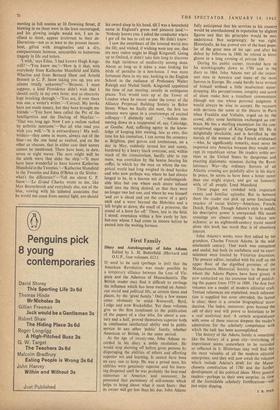First Family
IT used to be said (perhaps in jest) that the American Revolution was made possible by a temporary alliance between the Lees of Vir- ginia and the Adamses of Massachusetts. The British reader may find it difficult to envisage the influence which has been exerted on Ameri- can social and political life, at certain times and places, by the 'great family.' Only a few names come obviously to mind—Roosevelt, Byrd, Lodge and now Rockefeller. Yet these volumes give us the first instalment in the publication of the papers of a clan who, for about a cen- tury and a half, proved themselves superior both in continuous intellectual ability and in public service to any other 'public' family, whether American or British, in the same period.
At the age of twenty-one, John Adams re- corded in his diary a noble resolution. He would stop showing off before great persons by disparaging the abilities of others and affecting superior wit and learning. It cannot have been an easy one to keep. He was a proud man, his abilities were genuinely superior and his learn- ing deepened until he was probably the best-read statesman in America; and moreover, he possessed that parsimony of self-esteem which helps to bring about what it most fears: that its owner will get less than his due. John Adams
fully anticipated that his services to his country would be overshadowed in reputation by slighter figures and that his principles would be mis- understood. Not surprisingly, he was right. Historically, he has proved one of the least popu- lar of the great men of his age; and after his defeat by Jefferson in 1800, he retired in bitter gloom to a long evening of private life.
During his public career, recorded here in his autobiography down to 1780 and in the diary to 1804, John Adams met all the impor- tant men in America and many of the most famous in Europe. He could hardly have written of himself without a little inadvertent name- dropping. His perceptiveness, integrity and scorn of sham make him a trenchant commentator (though not one whose personal judgment it would always be wise to accept). He recounts with derision the scene at the theatre in Paris when Franklin and Voltaire, urged on by the crowd, after. some hesitation exchanged an em- brace. He has a startling encomium for the con- versational sagacity of King George .111 He is delightfully shockable, and is horrified by the morals of the women of the French aristocracy —who, he significantly remarks, must never be imported into America because they would cor- rupt its republican virtue. He renders noble ser- vices to the United States by dangerous and exacting diplomatic missions during the Revo- lutionary War—the ordinary horrors of an Atlantic crossing arc painfully alive in his diary. In peace, he seems to have been a better mixer than one might expect, and got on famously with', of all people, Lord Mansfield.
These pages are crowded with important events and familiar episodes. But in between them the reader can pick up some fascinating touches of social history—American, French, Dutch, English. Though Adams's style is untidy, his descriptive power is unexpected. His ocean crossings are almost enough to induce sea- sickness; as an eighteenth-century travel record alone this book has much that is of absorbing interest.
John Adams's works were first edited by his grandson, Charles Francis Adams, in the mid- nineteenth century. That work was competent and useful, but both its usefulness and its enter- tainment were limited by Victorian discretion. The present editor, installed with his staff on the upper floor of the dignified premises of the Massachusetts Historical Society in Boston (to. whom the Adams Papers have been given), is now embarked on the immense task of publish- ing the papers from 1755 to 1889. The first four volumes are a model of modern editorial craft. Textual references are explained, much informa- tion is supplied but none obtruded, the layout is clear, there is a concise biographical intro- duction. The index, moreover, goes beyond the call of duty and will prove to historians to be a real analytical tool. A certain acquaintance with some of these sources deepens the reader's admiration for the scholarly competence with which the task has been accomplished.
The history of the Adams family is something like the history of a great city—everything of importance seems somewhere to be recorded or reflected in it. Historians may well find this the most valuable of all the modern editorial enterprises; and they will now await the volumes which include Adams's draft for the Massa- chusetts constitution of 1780 and the further development of his political ideas. More general readers—perhaps to their own surprise, in view of the formidable scholarly fortifications--will just enjoy dipping. R. POLg


































 Previous page
Previous page